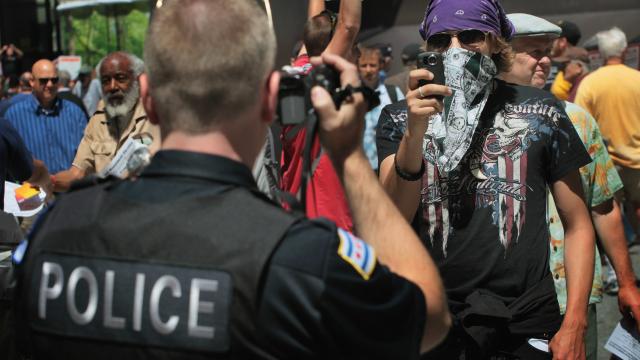In the past couple years, companies like Google and Facebook have struggled to find the right balance between useful and creepy with the development of facial recognition technology. Some law enforcement agencies, however, are not holding back their enthusiasm — and nobody’s going for it quite like the cops in San Diego.
The Center for Investigative Reporting just published an in-depth look into San Diego’s recent, rather unnervingly enthusiastic foray into the tactical use of facial recognition in the field. Armed with 133 Samsung Galaxy tablets and smartphones, law enforcement agencies in San Diego and Imperial Counties have started scanning suspects’ faces and cross-checking them all with the state of California’s mugshot database, that also happens to be linked to the state’s 32 million driver’s licence photos.
If the so-called Tactical Identification System (TACIDS) find a match, it gives the officer instant access to information about previous arrests, including the suspect’s home address, criminal history, and so forth. Handy!
Obviously, of course, there are some serious privacy concerns here. A TACIDS draft policy explores different scenarios that would lead to officers using facial recognition, and, believe it or not, one doesn’t require the officer to stop the person at all. In this scenario, they could simply use facial recognition tech on security camera footage or even social media (read: selfies). Especially in a scenario where an officer stops and confronts someone, Fourth Amendment concerns come into play. Think about it: if a cop knows he can simply use his tablet to perform an instantaneous background check, this newfound power would presumably affect how he decides who’s a suspect and who’s an innocent bystander.
But is this OK? Well, US courts have yet to rule on a case involving police use of facial recognition. Plenty of people don’t think so. The Electronic Frontier Foundation (EFF) published a lengthy blog post in response to the Center for Investigative Reporting’s feature. In it, the EFF’s Jennifer Lynch points to a quote from an Arizona Supreme Court justice who said “[t]he thought that an American can be compelled to ‘show his papers’ before exercising his right to walk the streets, drive the highways or board the trains is repugnant to American institutions and ideals.”
For now, the use of facial recognition in day-to-day police work will continue. So far, the various law enforcement agencies in San Diego have made 5,629 queries since TACIDS launched. However, that does not count all the other agencies around the country that are catching onto the trend. Homeland Security, border control, the FBI — they’re all thinking about face scanning, too. And this is just a small part of the broader shift towards the militarization of police forces, a situation serious enough that people are writing entire books about it.
